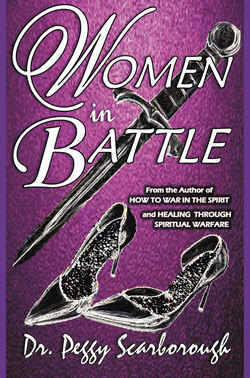Читать книгу Women in Battle - Peggy Scarborough - Страница 8
На сайте Литреса книга снята с продажи.
Hannah, a Prayer Warrior
ОглавлениеHannah was a barren woman. But she believed God for a miracle. Every year she went to the temple at Shiloh to pray for a child. Elkanah. Hannah's husband, loved her dearly. But there was another wife involved, Peninnah, who bore Elkanah children. She made fun of Hannah because of her barrenness. Hannah must have prayed a long time without receiving an answer from God. Yet Hannah's husband loved her dearly. On one trip to Shiloh, Hannah was in deep distress. Elkanah said, "Why are you crying and why aren't you eating? Why is your heart grieved? Am I not better to you than ten sons?"
But Hannah was so heart-broken that she went into the tabernacle to pour out her soul to God. She had no doubt done this before. In fact, she had prayed so often that people could probably repeat her prayer for her that God give her a son. It appeared that everyone had heard her prayer but God. But this day she made a radical change in her praying. She desperately attempted to move God on her behalf. She violently leaped into prayer. John Avanzini says in his delightful book, Moving the Hand of God: "A desperate plunge into the arms of God brings His supply in the time of need." She prayed fervently: '0 Lord of hosts (which means Lord of battles), if thou wilt indeed look on the affliction of thine handmaiden, and remember me, and not forget thine handmaid, but wilt give unto thine handmaid a man child, then I will give him unto the Lord all the days of his life' ... (l Sam. 1: 11). Her prayer was one of a cry to God like a neglected child. She was saying, "God don't forget me." She was actually bargaining with God. Is this right for us today?" John Avanzini again reminds us that God has tattoos: "Behold, I have graven thee upon the palms of my hands" ... (Is. 49: 16). Avanzini says, "Our names are tattooed inside His palms so that we are continually kept before Him. The context shows that it is to keep Him for forgetting us" (Moving the Hand of God, p. 36).
The prayer was so fervent that Eli the priest thought she was drunk. Hannah explained, "No, my Lord, I am a woman of sorrowful spirit: I have drunk neither wine nor strong drink, but have poured out my soul before the Lord" (1 Sam. 1: 15). When Eli saw her firm faith, he joined with her in prayer for the miracle child. The next morning Hannah joined her husband and family for worship.
The amazing thing was that God now answered her prayer. "And they rose up in the morning early, and worshiped before the Lord, and returned, and came to their house to Ramah: and Elkanah knew Hannah his wife; and the Lord remembered her" (1 Sam. 1:19). She was pregnant. This reminds us of what God said in Isaiah 54: 1: "Sing, 0 barren, thou that didst not bear; break forth into singing, and cry aloud, thou that didst not travail with child: for more are the children of the desolate than the children of the married wife, saith the Lord." That simply means that God has more children in the spirit world than the married wife has on earth. In prayer, one brings the manifestation to earth of that which God already has in the spirit world. Hannah brought the manifestation of a child to earth.
When the child was born, Hannah named him Samuel, which meant "asked of the Lord." When the child was weaned, she took him to the temple to present him to the Lord. Had Hannah not been such a warring woman, there would never have been the great prophet Samuel.
What happened? Here was a woman who was barren. For years her prayers had gone unanswered. Now she prays a violent warring prayer and God remembers her and opens her womb. In fact, not only did she give birth to Samuel, but she had three sons and two daughters (l Sam. 2:21). She promised to give something back to God if He would remember her. She mixed her praying and her giving and God rapidly moved in her life.
